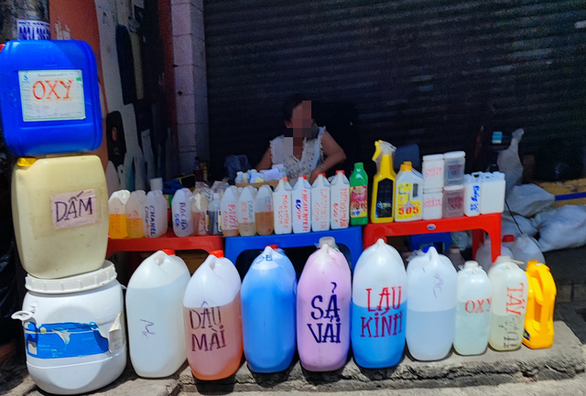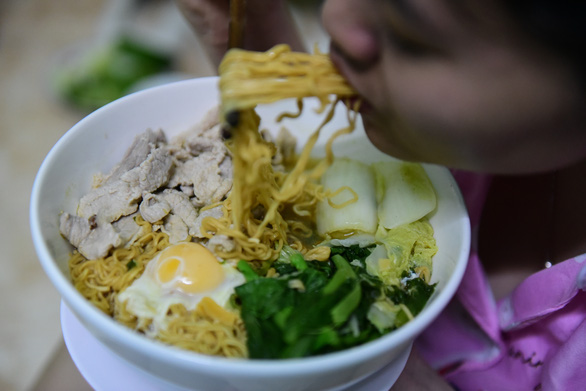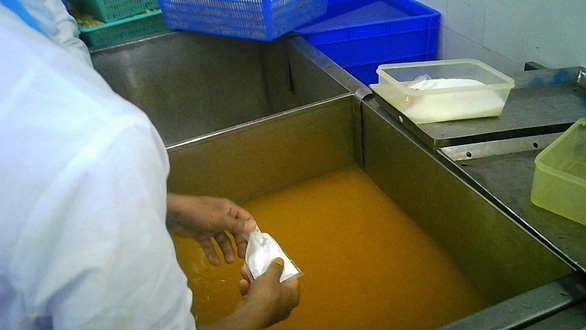Many chemical additives banned in both developed and underdeveloped countries in the world are still acceptable in Vietnam, with local regulatory agencies refraining from issuing guidelines on potentially dangerous chemicals.
Countries around the globe have been issuing recalls of many made-in-Vietnam products, particularly instant noodles found to contain ethylene oxide, a pesticide many nations have banned from consumption.
Moderate use of chemicals
In mid-July, Tuoi Tre (Youth) newspaper reporters posed as job-seekers at a factory run by X.L. Food Processing Co. Ltd. at Vinh Loc Industrial Park in Binh Chanh District, Ho Chi Minh City.
X.L.’s main product is potato string wrapped shrimp. The company currently employs approximately 400 workers.
The undercover reporters’ goal was to learn exactly how the company had been using unregulated chemicals in its food processing operations.
During their probation period, the undercover reporters earned VND190,000 (US$8) per day.
In a five-square meter chemical storage room, the reporters found a white substance that one of the company's employees claimed was a type of salt used to whiten the potato strings.
H., a worker from Cam Lo District, central Quang Tri Province, showed the undercover reporters the factory’s processes, which included pouring water into three stainless steel tanks and three bags of powder into two additional tanks.
H. explained that “the potato strings are soaked in tanks for 15 minutes until they are soft and evenly colored before they are put into the water tanks.”
“Those boxes over there,” H. said, pointing to an area near the tanks, “contain salt and turmeric. There is also probably some sort of chemical but I do not know exactly what it is. It has peeled the skin from my hands though.”
Inside the facility, the journalists later found that some of the bags in the chemical warehouse contained magnesium sulfate, also known as Epsom salt, a solidifying substance imported from China.
|
|
| Many of Vietnam’s well-known instant noodle products have been recalled in some countries because of containing ethylene oxide. Photo: Quang Dinh / Tuoi Tre |
Magnesium sulfate is currently prohibited in the European Union (EU) and the U.S. even though it is allowed to be used as an additive in Vietnam.
N.V.T., 41, a resident of southern Long An Province, who worked for X.L. Food Processing Co. Ltd. for 21 years, said that he started working at the firm when he was 18.
By the time he quit, his salary was VND14 million ($592) per month – a sizeable amount for a factory worker in Vietnam.
Still, the high pay was no match for the havoc that chemicals in the factory wreaked on his body.
“I left because I was suffering from varicose veins and the daily exposure to chemicals caused me to get sinusitis,” T. said.
“The white sulfate had to be crumbled before being put into water and the odor gave me a serious headache."
Inconsistent regulations
Magnesium sulfate heptahydrate (MgSO4.7H2O) is an additive numbered 518 on the International Numbering System.
In Vietnam, under the Codex Alimentarius, a collection of international standards, guidelines, and codes of practice meant to protect the health of consumers and ensure fair practices in the food trade, as well as according to the Ministry of Health’s Circular 24/2019, magnesium sulfate can be used in food as a solidifying substance and flavor enhancer.
Meanwhile, the German Federal Office of Consumer Protection and Food Safety on October 2, 2020 warned against the consumption of soya curd produced by Hankuk, a German food processing company, for containing magnesium sulfate, boric acid, and other banned additives.
According to Dr. Le Duc Dung from the University Hospital Würzburg in Germany, French fries contain olony, an alternative to artificial fat.
Olony is currently prohibited in Canada and Europe.
Instant mashed potatoes are also banned in Japan and Europe as they contain butylhydroxyanisole, a preservative which may do harm to human health, according to the U.S. National Institutes of Health.
Butylhydroxyanisole can be found in frozen products, soup, and mayonnaise.
Vietnam is yet to issue regulations on these substances.
Tran Viet Nga, deputy head of the Vietnam Food Administration under the Ministry of Health, told Tuoi Tre that the government recently directed the Ministry of Industry and Trade to follow in the footsteps of South Korea and Japan and issue regulations on ethylene oxide residues in food.
According to Nga, though Vietnam follows standards of the Codex Alimentarius Commission, it has yet to issue regulations on the use of ethylene oxide.
Aside from ethylene oxide, many other substances are allowed in Vietnam despite being banned elsewhere, posing a risk of recalls and raising concerns among domestic consumers.
It is normal for different countries to have different regulations, Nga said.
In Vietnam, the difficulties of managing the food safety result from the involvement of four separate ministries, including the Ministry of Health, the Ministry of Industry and Trade, the Ministry of Science and Technology, and the Ministry of Agriculture and Rural Development.
Regarding the differences in food safety management between Vietnam and other countries, Dung from the University Hospital Würzburg said each country has its own rules on the use of additives in food. These regulations are often proposed by specialized councils.
Food producers must comply with the regulations of the countries in which they wish to sell their products.
In developed countries and blocs, such as the U.S. and the EU, additives are studied and assessed more carefully.
Therefore, regulations on the use of these substances in the U.S., the EU, and Japan are stricter. Less developed countries can learn from developed countries to update their regulations.
|
|
| A screenshot shows a person pouring a bag of white powder into a tank in which salt and turmeric are dissolved in water at X.L. Food Processing Co. Ltd. at Vinh Loc Industrial Park in Binh Chanh District, Ho Chi Minh City. Photo: T.Thuong / Tuoi Tre |
Draft regulations on limits of chemical residues in food
According to Nguyen Nhu Tiep, director of the National Agro-Forestry-Fisheries Quality Assurance Department under the Ministry of Agriculture and Rural Development, Deputy Prime Minister Vu Duc Dam has asked the ministry to draft national standards on food safety for products under its management.
Once completed, the draft standards will be transferred to the Ministry of Health for issuance.
Tiep added that the Ministry of Agriculture and Rural Development regularly gets updates on international standards in food safety.
“According to the Codex Alimentarius and Vietnam’s Law on Food Safety, national regulations must be in line with international standards and products must meet importing countries’ requirements," Tiep said.
“Vietnam is applying this principle.”
Meanwhile, a representative of the Science and Technology Department under the Ministry of Industry and Trade told Tuoi Tre that the Ministry of Health had classified groups of products to be managed by ministries and these ministries are currently developing standards for each product.
“At the end of 2022, ministries and agencies are expected to complete the development of these standards. Limits on substance residues in food products will be publicized by the Ministry of Health, while draft regulations will be jointly built by the Ministry of Agriculture and Rural Development and the Ministry of Industry and Trade in association with the health ministry.”
The representative added that relevant agencies are studying scientific grounds and the reality to lay the foundation for these drafts.
However, the job has yet to be completed so it is impossible now to discuss advantages and difficulties during the building of standards and which country's regulations Vietnam will base its own standards on, the representative said.
The drafts, after being completed, will be sent to the Ministry of Health for synthesis.
Pursuant to the government’s Decree 15 detailing the implementation of a number of articles of the Food Safety Law, the Ministry of Health is responsible for managing bottled beverages, dietary supplements, and food additives.
Meanwhile, the Ministry of Agriculture and Rural Development is charged with managing cereal, meat, seafood, fruits and vegetables, eggs, raw milk, spices, tea, coffee, sugar, and other agricultural products.
In addition, the Ministry of Industry and Trade manages beer, alcohol and alcoholic drinks, processed milk, vegetable oil, flour, and confectionery.
Like us on Facebook or follow us on Twitter to get the latest news about Vietnam!

























































